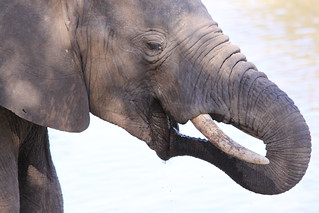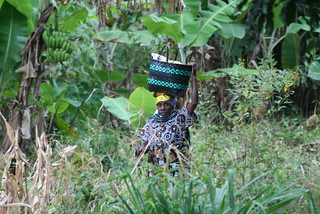By Suzanne York.? Original posted at 6degreesofpopulation.org
During that 15 minute coffee break you took this morning, somewhere across the ocean an elephant was killed.? It is estimated that every 15 minutes an elephant is slaughtered, about 40,000 annually.
It makes you wonder how much longer wild elephants will roam the earth.? Because at this rate, with high global demand for ivory and high levels of poverty for people that live near these creatures, they won?t be around for much longer.
The New York Times recently ran an op-ed by Carl Safina of the Blue Ocean Institute called ?Blood Ivory? that highlighted the forces at play.? Certainly consumption and poverty are drivers, but Safina pointed out how international policy has failed elephants.? A loop-hole of sorts in the Convention on International Trade in Endangered Species (CITES ? an international agreement that regulates the trade of endangered plants and wildlife), allows for one-time sales of ivory stockpiles, resulting in skyrocketing demand for ivory.? Ironically, a CITES ban on ivory in 1990 was successful in increasing elephant populations, yet this same multilateral environmental agreement is now feeding demand for ivory.
The graph below is from the just released United Nations Environment Programme Year Book 2013, which noted that ?2011 was the worst year on record for ivory seizures? for elephants and rhinos.

It is undeniably a bleak situation, yet there are some solutions ? beyond ending the CITES loop-hole ? that can begin to address and hopefully change the situation for the better, for both people and elephants.? Two solutions are empowering women and recognizing rights of nature.
Solution: Empowering Women
Addressing the needs of women can benefit communities and the environment.? Women are on the frontlines of coping with the effects of environmental degradation. In most countries around the world they are the main providers of food, water, and other resources for their families. When women are empowered, they can better support their families and adapt to environmental impacts, including climate change.
A woman?s decision on when and whether to have a child and her access to reproductive care, as well as education, are key components of a healthy and sustainable society.
In Tanzania, for example, family planning use has increased among married women since the early 1990s, yet it is still relatively low in the country, rising from 10 percent in the early 1990s to 34 percent in 2010, according to Population Reference Bureau.
Part of empowering women is addressing inequity.? Tanzania currently has 46 million people, estimated to increase to 82 million people by 2050. Most poachers are driven by grinding poverty, in a country where nearly 70 percent of the Tanzanians live on less than $1.25 per day. When people?s basic needs are met, they choose to invest in their families and communities.

Empowering Tanzanian women and families with reproductive rights, healthcare, education and sustainable and secure livelihoods can and will improve the situation and enable them to overcome challenges.
Of course, poachers tend to be men, and males with little education or few job prospects need to find ways to survive and feed their families.? Men need to be invested in and empowered too, to overcome poverty and a lack of quality jobs, and to have the right to an education.? Ultimately it comes down to empowering all people.
Solution: Rights of Nature
Earth does not exist for our species alone. Elephants and species all over the world are at grave risk due to human development and demand. The planet is undergoing its sixth mass extinction. Despite global conservation efforts, more species are lost every day. Worse, some like elephants and rhinos, are poached only for their tusks and left to die.
Given this situation, there is a growing movement around recognizing rights of nature that acknowledges that nature in all its life forms has the right to exist, persist, maintain and regenerate its vital cycles. This is another solution for protecting elephants. Under this thinking, nature is not viewed as property and something to be exploited by humans.
There is precedent. Ecuador has included rights of nature in its state constitution, recognizing the legal right of ecosystems to exist. Bolivia has passed a law of Mother Earth, mandating nature legal rights, specifically the rights to life, regeneration, biodiversity, water, clean air, balance, and restoration. Rights of nature has been upheld in Ecuadorian court.
Considering Tanzania again, which still has a somewhat viable elephant population, recognizing rights of nature could be one way to protect remaining numbers.? The country recently rescinded a proposal to sell a stock-pile of ivory under the CITES loophole.? If rights of nature laws were in place, then selling ivory could be found illegal.
Natural laws should be constructed to be in balance with the needs of local people; as stated above, even poachers need education and sustainable economic alternatives.? Currently though, neither elephants/nature, nor people, are winners in this terrible situation.
Ensuring a Brighter Future
Not to be overlooked is the role of consumption.? Educating and empowering women and girls, promoting economic and sustainable livelihoods for local populations, and pulling people out of poverty must be top priorities.? But if there are no consumers for a product, or if there is a ban, then the market theoretically disappears, as happened with the earlier CITES ban.? A ban on ivory trading must be reinstated across the board, no exceptions.? And consumer education must also be made a priority.? Buyers of ivory need to fully comprehend ? and care ? about the true costs of ivory.
It is estimated that Africa has lost close to 90 percent of its elephants in the last fifty years.? There is still a small window of opportunity to change this picture and protect elephants and the people who share the land with them.? This is not negotiable; this is how a civilized society should function.? The global community knows what to do ? fully implement a ban on ivory, invest in people?s rights and livelihoods, and protect and respect nature.
(Elephant photo credit: Derek Keats, http://www.flickr.com/photos/dkeats/6026172562/sizes/m/in/photostream/)
(Tanzanian woman photo credit: NewsHour, http://www.flickr.com/photos/newshour/3724432128/sizes/m/in/photostream/)
Suzanne York is a senior writer with the Institute for Population Studies.
Women?s empowerment and rights of nature are just two of many issue areas on Wiser.org where you can find people, groups and organizations focusing on the issues that matter.
 ?Print Friendly
?Print Friendly Tags: elephants, endangered species, human rights, poverty, rights of nature, women's empowerment
Source: http://blog.wiser.org/protect-elephants-by-addressing-rights-of-people-and-nature/
april 20 jennifer love hewitt secret service prostitution 4 20 george zimmerman sheree whitfield weather dallas
No comments:
Post a Comment
Note: Only a member of this blog may post a comment.